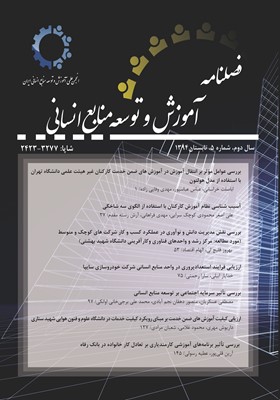آسیبشناسی نظام آموزش کارکنان با استفاده از الگوی سهشاخگی
محورهای موضوعی :علی اصغر محمودی کوچکسرایی 1 , مهدی فراهانی 2 , آرش رستهمقدم 3
1 -
2 -
3 -
کلید واژه: آسیبشناسی سازمانی الگوي سهشاخگی وزارت نیرو تحلیل محتوا,
چکیده مقاله :
هدف پژوهش حاضر، آسيب شناسي نظام آموزش کارکنان یکی از شرکتهای مادر تخصصی تابعه وزارت نیرو با استفاده از الگوي سه شاخگي است. در الگوي مذکور، سازمان ها از سه منظر ساختاري، رفتاري و زمينه اي مورد بررسي قرار مي گيرند. اين پژوهش به لحاظ روش شناسي، رويکردي کيفي دارد که به کمک ابزارهايي از جمله مصاحبه و پرسشنامه هاي باز پاسخ صورت گرفته است. روايي ابزار از طريق آزمون کرونباخ و پايايي آن به کمک روش بررسي همتايان مورد تأييد قرار گرفت. از روش سرشماري در نمونه گيري و گردآوري داده ها و از روش تحليل محتوا در تحليل يافته ها استفاده شده است. تحلیل یافته ها نشان داد بیشترین چالش ها، نقاط قوت و فرصت های قابل بهبود در مقوله ساختار قرار دارد. هم چنین بیشترین انتظارات دست اندرکاران بخش آموزش از مراجع بالادستی در شاخه ساختار جای می گیرد. این بدان معناست که در نظام آموزشی فعلی کانون توجه به سمت مسایل درونسازمانی است. بر این اساس می توان گفت در حال حاضر مقوله های رفتاری و محیطی کمتر مورد توجه واقع شده اند. در پايان پيشنهادهايي به منظور رفع آسيب هاي نظام آموزشي موجود ارایه شده است.
The influential factors of organizational training in a holding company affiliated to the ministry of energy examined by a diagnostic trichotomy model. Using a descriptive research inquiry a content analysis of organizational characteristics was applied. The sample was included all managers and experts that worked at the training and development department of all 90 affiliated companies which are under the holding company's directions. The means of gathering data was a series of structured, semi-structured, and unstructured/open questions and interviews. In order to content analysis, after extracting relevant concepts, themes, and contents, each items classified into one of the three (structural, behavioral, environmental/context) dimensions of the model. The results show that structural component has a more influential effect on explanation of strength and weakness of training and development activities than the other two components. In this regard, the article concluded that structural/process aspect of organizational training met with more difficulties than behavioral and context so need to pay more attention. Finally, it seems that the trichotomy model of analysis is a useful diagnostic approach to the organizational pathology and could lead to appropriate applied results.


